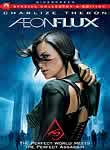Movie: Aeon Flux (SF)
 Aeon Flux is the laziest SF movie I've ever seen. Its worldbuilding, internal logic, and character development are all just. . . lazy. Science fiction is an amazing genre for exploring both human nature and the interaction between technology and ethics, but as both a SF movie and a movie about human behavior this film is total crap.
Aeon Flux is the laziest SF movie I've ever seen. Its worldbuilding, internal logic, and character development are all just. . . lazy. Science fiction is an amazing genre for exploring both human nature and the interaction between technology and ethics, but as both a SF movie and a movie about human behavior this film is total crap.Four hundred years after some disease almost eliminated humankind, the descendants of the survivors are enclosed in one city while the rest of the world has been completely overgrown. Aeon Flux (Charlize Theron) is a member of a secret rebellion called the Monicans (Are they from Monica? Do they worship a Monica? Was Monica the first rebel? We'll never know.) trying to overthrow the government because they believe the govt. is kidnapping people for reasons neither they--nor we--understand. When Aeon's sister is murdered by said govt., Aeon begins taking her rebel duties even more seriously. She meets some guy and uncovers a Shocking Government Secret. At this point, the movie, unspectacular so far, really begins to fall apart.
***spoilers ahead***
Aeon discovers that the world is entirely populated by clones; apparently, the drug that protected the survivors from the epidemic also made them sterile. In the world of the movie, we are asked to assume that cloning is a Bad Thing, even though the movie gives us little internal evidence to make that point and instead relies on our assumptions that cloning is bad, mmmkay. However, I'm guessing that this film will probably attract viewers who are SF-savvy and therefore probably more accepting of human cloning than the general public. Such viewers will need some convincing, but they won't find it here: while this film's plot relies completely on the idea that cloning is bad and that the rebels should stop it, it makes no effort to convince the viewer AND offers no alternate way for the rebels to populate the earth. Strike one.
In the world of this film, the only real problem with cloning seems to be that people are beginning to feel a little funny and are having Bad Dreams. (If we are given any information about the content or emotional effects of these dreams, I don't remember it. Not saying it didn't happen, just that I don't remember it. At all.) This ill-defined problem seems to be escalating even though it could easily be solved by re-cloning the survivors' original DNA instead of cloning the clones. Even if they are cloning the clones, you would think cloning technology would have advanced enough in 400 years to compensate for the negative effects of clone decay. This whole aspect, which is given as the only reason that cloning is bad and therefore forms the foundation of the conflict, is not explained in any meaningful detail. Strike two.
Aeon discovers that she is the first clone made from her original DNA-mother. Weirdly enough, she remembers the original woman's memories of being in love with original version of the seventh-generation clone-guy she meets in the present. Clone-guy has had to teach each generation of himself about the original Aeon to keep alive the memories of their love, yet Aeon experiences a distinct memory of kissing the original guy at the time she first meets the clone-guy. Excuse me, but exactly which strand of DNA carries memories of events that have not yet occurred when the DNA is created??? Also, Aeon is a first-generation clone, but she claims to have the same (ill-defined) problems as people who have been cloned many times before. Umm, why would she, especially since she apparently was specially-cloned by the head scientist guy; wouldn't you think he would take Extra Special Care while cloning her since he intended for her to save the world? Strike three.
This film has a spectacular cast, solid acting, and nice action scenes, gadgets, and visual effects. Unfortunately, it relies too much on eye-candy and not enough on plot, character, or any sense of the purpose or possibilities inherent in SF. (I won't even bother addressing the heroine's too-tight black leather or insistence on standing with her feet three feet apart.) Consider this film Tomb Raider Lite, and not in a good way. Grade: D-






